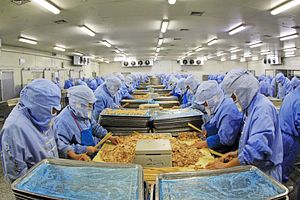A food safety scandal that came to light on Sunday has already managed to reach all the way from parent company OSI in the U.S., to the producer Shanghai Husi Food Co Ltd. in mainland China, and finally to consumers as far away as Hong Kong and Japan. The recent scare highlights two problems: the vulnerability of large regional markets due to the interconnectivity of their supply chains, and an additional level of concern for Chinese consumers who have in recent years come to expect foods made by foreign companies to have a higher level of quality and safety.
The scandal began on Sunday when undercover video shown by state-owned Dragon TV exposed workers putting new sell-by dates on meat products that were already past due at a Shanghai Husi facility. The firm is a supplier for restaurant chains like McDonald’s Corp, KFC, and Starbucks Corp, and by Wednesday major Japanese retailers who are also Shanghai Husi customers like Seven & and I Holdings Co Ltd. and FamilyMart Co Ltd. were joining other major companies in withdrawing products originating from the plant in question.
The owner of the parent company of the plant, OSI chief executive officer Sheldon Lavin, took responsibility for the problem and said “what happened at Husi Shanghai is completely unacceptable.” OSI owns eight other production facilities across China, although Lavin assured the public that “authorities have inspected the company’s other facilities in China and had not found any issues.” Yum Brands, the operator of some 4,600 KFC and 1,100 Pizza Hut restaurants in China, as well as Starbucks, have severed their relationships with OSI, while McDonald’s has said it will only use products from OSI’s other facilities. Along with Japan, McDonald’s Hong Kong has suspended the sale of several items, while the city’s assistant director of food and environmental hygiene said “any Husi food already in Hong Kong would be sealed and stored in warehouses.”
Meanwhile on Wednesday, police in Shanghai detained five people related to the incident, among them the head of Shanghai Husi and its quality chief, according to Reuters. The Shanghai Municipal Food and Drug Administration said it had sent 875 personnel to 581 locations where tainted meat Husi is suspected to have been used, while the national government’s food regulator has investigated almost 600 locations. In what is probably a more disturbing revelation, the deputy director of Shanghai’s Municipal Food and Drug Administration, Gu Zhenhua said:
“Some of the company’s illegal behavior was not the behavior of individuals, but rather an organized arrangement by the company. The company has a set of systems to dispose of expired food, and there were records too, but both the system and records were going against the law of this country,” according to Xinhua News Agency.
While this is merely the latest of China’s many food scandals since tainted milk in 2008 was discovered to have killed six infants and sickened almost 300,000, it poses a new and unique set of problems for China, and the regional partners tied to its food production supply chain.
China faces the larger problem as this affects its producers, retailers and consumers. While all three groups have been aware of the health risks associated with food produced by Chinese companies for some time, Shanghai Husi is a foreign-owned company, and its facilities were thought to be held to a higher standard of quality control as a result. Many Chinese consumers expect food bought at Western franchises like McDonald’s and KFC to be safer than the food found at local Chinese establishments. This loss of faith will not only impact these large companies, but the Chinese government may also again be held responsible by the public, as it was in 2008.
This latest scandal has also significantly impacted those countries that are part of China’s supply chain, particularly Japan, where several major retailers suspend the sale of a wide range of food products. Japan is noteworthy in that it is almost uniquely sensitive to the real or implied threat of tainted food products. After the Fukushima Daiichi nuclear disaster in 2011, whole swaths of one of Japan’s most productive agricultural centers became defunct as consumers shunned their products, despite being outside (and sometimes well away from) the official exclusion zone. Rather than gradually returning to normal, this issue has been kept in the public consciousness through popular media. Food products from China are already viewed with suspicion, and brands that have been recognized and trusted for their safety may now be conflated with those suspicions.
































